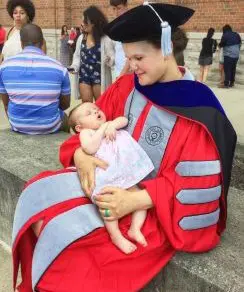The number of female doctorate recipients has increased in the last decade as student demographics have changed. Women, in fact, earned 58% of all doctorates in 2021 in non-science and engineering fields (National Science Foundation, 2023). Despite these gains, there has been an insufficient focus on the experiences of student mothers. This nontraditional student group does not fit the typical college profile and therefore requires greater attention and support to better understand and address the challenges they face as full-time doctoral students at research universities.
The U.S. Department of Education describes nontraditional students as having at least one or more of the following characteristics: delayed enrollment, working while studying, having dependents other than a spouse, and being financially independent (National Center for Education Statistics, 2023).
According to the Association of Nontraditional Students in Higher Education (ANSHE), nontraditional graduate students are defined as adult learners who engage in part-time higher degree programs while working full-time jobs or those who resume their studies after a prolonged break due to life events such as military service or family-related circumstances. Because they strive to balance their family responsibilities with their academic commitments, these types of student populations differ from the target audience of the general university student policies and need more support. That support includes addressing structural inequities (Curtis, 2004), adding counseling assistance on campus (Eisenbach, 2013), and addressing well-being issues that go along with parenting and maintaining full-time status in a graduate program (Ajayi, 2022; Lundquist, Rubel & Ng, 2020; Schriver 2021).
These issues lead to significant challenges for student mothers and, unfortunately, to higher dropout rates. Statistics of all doctoral student attrition are high in North America, indicating that 40% to 50% leave school (Litalien & Guay, 2015). Research indicates that women with children are less likely to finish a doctoral program than their male or childless counterparts (National Science Foundation, 2023), which is why it is crucial to acknowledge and support the unique challenges that doctoral mothers face in achieving their academic and career goals.
As additional academic pursuits demand more outstanding commitments, it can be challenging for mothers to balance their responsibilities, which can include being a full-time graduate student, a graduate assistant, a partner, or a mother, as well as experiencing other familial and community roles that differ for the typical graduate student (Armenti, 2004; Mirick & Wladkowski, 2018; Catalano & Radin, 2021).
A recent study by Bodkin and Fleming (2021) emphasized the need for family-friendly policies for doctoral students to promote gender equality and support female student parents. This is especially important considering the limited income and high child care costs faced by doctoral students in the U.S., as highlighted by Mirick & Wladkowski (2020) and Navarro-Cruz et al. (2023).
Women, particularly doctoral-student mothers, still face academic challenges despite their dominance in higher education. More women earn doctorates in non-science and engineering fields than men, earning 58% of all doctorates in 2021 (National Science Foundation, 2023). A better understanding of their challenges is needed to increase their presence in higher education (England et al., 2007). The following policy-level changes could help address structural inequities (Curtis, 2004):
- An update of student-support policies tailored to the diverse needs of graduate students (Bodkin & Fleming, 2021; Ajayi, 2022; Lundquist, Rubel & Ng, 2020; Schriver 2021)
- A reform of campus resources to target different populations on campus, such as subsidized child care, family housing, and support when it comes to school choice (Mirick & Wladkowski, 2020; Navarro-Cruz et al., 2023)
- Changes to address structural inequities that challenge female students to delay starting a family and have children later in their careers (Curtis, 2004)
- An update of the program curriculum to meet student demographics (Mirick & Wladkowski, 2018; Catalano & Radin, 2021)
Many challenges for women in higher education and academia must be researched. Informed policy-level changes will help give equal access and equity to all education stakeholders and participants.
References
Ajayi, K. V., Odonkor, G., Panjwani, S., Aremu, O., Garney, W., & McKyer, L. E. (2022). Socio-ecological barriers to student-parents academic success: A systematic review. Journal of Further and Higher Education, 46(9), 1257-1274.
Armenti*, C. (2004). Women faculty seeking tenure and parenthood: Lessons from previous generations. Cambridge Journal of Education, 34(1), 65-83.
Bodkin, C. P., & Fleming, C. J. (2021). Supporting women scholars’ paths to academia: Examining family-friendly policies of public affairs doctoral programs. Journal of Public Affairs Education, 27(3), 301–325. https://doi.org/10.1080/15236803.2019.1694385
Catalano, A. J., & Radin, S. T. (2021). Parents Pursuing a Doctorate of Education: A Mixed Methods Examination of How Parents Manage the Roles of Student and Parent. International Journal of Doctoral Studies, 16, 253–272. https://doi.org/10.28945/4741
Curtis, J. W. (2004). Balancing work and family for faculty: Why it’s important. Academe, 90 (6), 21–23.
Eisenbach, B. (2015). Finding a Balance: A Narrative Inquiry into Motherhood and the Doctoral Process. The Qualitative Report. https://doi.org/10.46743/2160-3715/2013.1528
England, P., Allison, P., Li, S., Mark, N., Thompson, J., Budig, M. J., & Sun, H. (2007). Why Are Some Academic Fields Tipping Toward Females? The Sex Composition of U.S. Fields of Doctoral Degree Receipt, 1971–2002. Sociology of Education, 80(1), 23–42. https://doi.org/10.1177/003804070708000102
Litalien, D., & Guay, F. (2015). Dropout intentions in Ph.D. studies: A comprehensive model based on interpersonal relationships and motivational resources. Contemporary Educational Psychology, 41, 218-231.
Lundquist, B., Rubel, D., & Ng, K. (2020). Experiences of Counselor Education Doctoral Student Mothers With Young Children. Counselor Education and Supervision, 59(4), 267–282. https://doi.org/10.1002/ceas.12188
Mirick, R. G., & Wladkowski, S. P. (2018). Pregnancy, Motherhood, and Academic Career Goals: Doctoral Students’ Perspectives. Affilia, 33(2), 253–269. https://doi.org/10.1177/0886109917753835
Mirick, R. G., & Wladkowski, S. P. (2020). Women’s Experiences with Parenting During Doctoral Education: Impact on Career Trajectory. International Journal of Doctoral Studies, 15, 089–110. https://doi.org/10.28945/4484
National Center for Education Statistics, 2023. Retrieved from https://nces.ed.gov/pubs/web/97578g.asp
National Science Foundation, 2023. Retrieved from https://www.nsf.gov
Navarro-Cruz, G. E., Dávila, B. A., Amaya, A., & Orozco-Barajas, I. (2023). Accommodating life’s demands: Childcare choices for student parents in higher education. Early Childhood Research Quarterly, 62, 217–228. https://doi.org/10.1016/j.ecresq.2022.08.009
